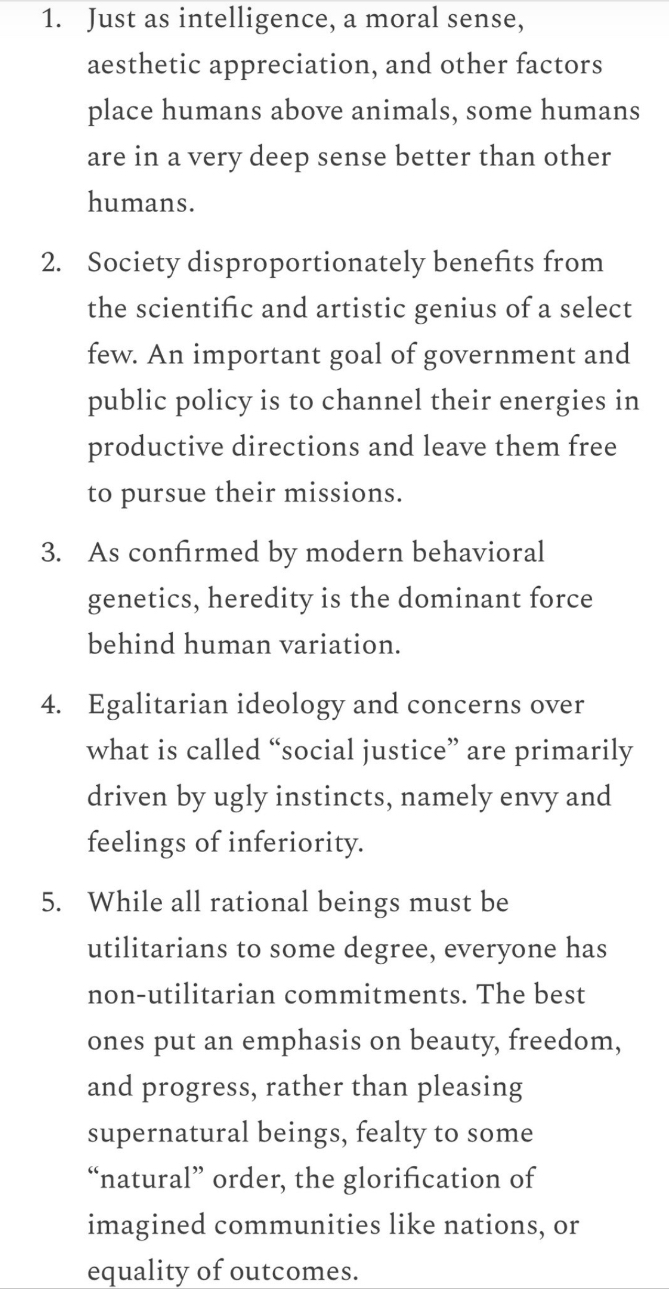Here are the five main beliefs:

If the image is hard to read:
1.Just as intelligence, a moral sense, aesthetic appreciation, and other factors place humans above animals, some humans are in a very deep sense better than other humans.
2.Society disproportionately benefits from the scientific and artistic genius of a select few. An important goal of government and public policy is to channel their energies in productive directions and leave them free to pursue their missions.
3.As confirmed by modern behavioral genetics, heredity is the dominant force behind human variation.
4.Egalitarian ideology and concerns over what is called “social justice” are primarily driven by ugly instincts, namely envy and feelings of inferiority.
5.While all rational beings must be utilitarians to some degree, everyone has non-utilitarian commitments. The best ones put an emphasis on beauty, freedom, and progress, rather than pleasing supernatural beings, fealty to some “natural” order, the glorification of imagined communities like nations, or equality of outcomes.
(Every time there is a space between the “#.” and letters it messes with the formatting so I have to eliminate the space, so I apologize if it’s hard to read)


I should’ve specified that by “link” I meant the Nazis utilizing his school of thought (even if they did it pervertedly) rather than them being buddy-buddy. I apologize for the confusion.
Nietzsche’s work fell into the hands of his sister when he became ill, and she was an outright fascist and colonizer whose funeral was attended by Hitler. If I remember correctly there is solid evidence she altered Nietzsche’s work to align with nazi ideology.
It’s been a long time since I read N’s work, but from what I recall it doesn’t fit nicely into nazi ideology even though there is some similar sounding language. Nietzsche’s ubermensch would not be found within the violently enforced strict hierarchy of fascism.
If anything N presents a very strong criticism of European culture as a projection of the ruling class’ values onto the masses who obligingly fall in line. He hated Christianity as a facilitator of that projection by promoting meekness and compliance among the population. And he largely rejected anti-semitism while still having some weird views on race common to the era.
This has me wanting to reread his work now that I’m not a liberal.
This is true. Nietzsche hated his sister’s proto-fascism that became Nazism.
He said he wanted a gun so he could go into the street and shoot anti-semites.
He’s definitely one of the people I need to read into more. I know there is a class in my school that focuses on him and other German philosophers/thinkers (not Marx, unfortunately) but I’m still debating on whether I will take it.
No worries! Nietzsche’s philosophy is just a pretty tricky subject in general, maybe the most in the field. I just wanted to drop in a comment about that